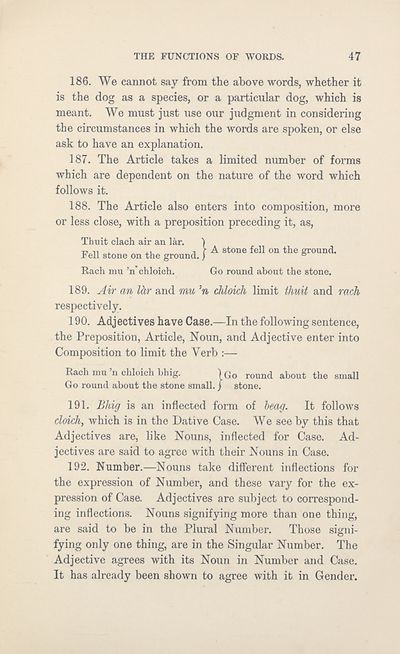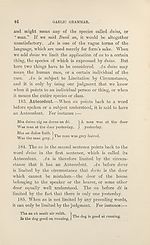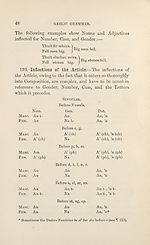Download files
Complete book:
Individual page:
Thumbnail gallery: Grid view | List view

THE FUNCTIONS OF WORDS.
47
186. We cannot say from the above words, whether it
is the dog as a species, or a particular dog, which is
meant. We must just use our judgment in considering
the circumstances in which the words are spoken, or else
ask to have an explanation.
187. The Article takes a limited number of forms
which are dependent on the nature of the word which
follows it.
188. The Article also enters into composition, more
or less close, with a preposition preceding it, as,
Thuit clach air an lar.
Fell stone on the ground.
Rach mu ’n'chloich.
A stone fell on the ground.
Go round about the stone.
189. Air an Ihr and mu }n chloich limit thuit and rach
respectively.
190. Adjectives have Case.—In the following sentence,
the Preposition, Article, Noun, and Adjective enter into
Composition to limit the Yerb :—
Rach mu ’n chloich bhig. 1 Go round about the small
Go round about the stone small.) stone.
191. Bhig is an inflected form of heag. It follows
cloich, which is in the Dative Case. We see by this that
Adjectives are, like Nouns, inflected for Case. Ad¬
jectives are said to agree with their Nouns in Case.
192. Number.—Nouns take different inflections for
the expression of Number, and these vary for the ex¬
pression of Case. Adjectives are subject to correspond¬
ing inflections. Nouns signifying more than one thing,
are said to be in the Plural Number. Those signi¬
fying only one thing, are in the Singular Number. The
Adjective agrees with its Noun in Number and Case.
It has already been shown to agree with it in Gender.
47
186. We cannot say from the above words, whether it
is the dog as a species, or a particular dog, which is
meant. We must just use our judgment in considering
the circumstances in which the words are spoken, or else
ask to have an explanation.
187. The Article takes a limited number of forms
which are dependent on the nature of the word which
follows it.
188. The Article also enters into composition, more
or less close, with a preposition preceding it, as,
Thuit clach air an lar.
Fell stone on the ground.
Rach mu ’n'chloich.
A stone fell on the ground.
Go round about the stone.
189. Air an Ihr and mu }n chloich limit thuit and rach
respectively.
190. Adjectives have Case.—In the following sentence,
the Preposition, Article, Noun, and Adjective enter into
Composition to limit the Yerb :—
Rach mu ’n chloich bhig. 1 Go round about the small
Go round about the stone small.) stone.
191. Bhig is an inflected form of heag. It follows
cloich, which is in the Dative Case. We see by this that
Adjectives are, like Nouns, inflected for Case. Ad¬
jectives are said to agree with their Nouns in Case.
192. Number.—Nouns take different inflections for
the expression of Number, and these vary for the ex¬
pression of Case. Adjectives are subject to correspond¬
ing inflections. Nouns signifying more than one thing,
are said to be in the Plural Number. Those signi¬
fying only one thing, are in the Singular Number. The
Adjective agrees with its Noun in Number and Case.
It has already been shown to agree with it in Gender.
Set display mode to:
![]() Universal Viewer |
Universal Viewer | ![]() Mirador |
Large image | Transcription
Mirador |
Large image | Transcription
| An Comunn Gàidhealach > An Comunn Gàidhealach Publications > Scottish Gaelic as a specific subject > (51) |
|---|
| Permanent URL | https://digital.nls.uk/125955629 |
|---|
| Description | This contains items published by An Comunn, which are not specifically Mòd-related. It includes journals, annual reports and corporate documents, policy statements, educational resources and published plays and literature. It is arranged alphabetically by title. |
|---|
| Description | A collection of over 400 items published by An Comunn Gàidhealach, the organisation which promotes Gaelic language and culture and organises the Royal National Mòd. Dating from 1891 up to the present day, the collection includes journals and newspapers, annual reports, educational materials, national Mòd programmes, published Mòd literature and music. |
|---|---|
| Additional NLS resources: |
|

